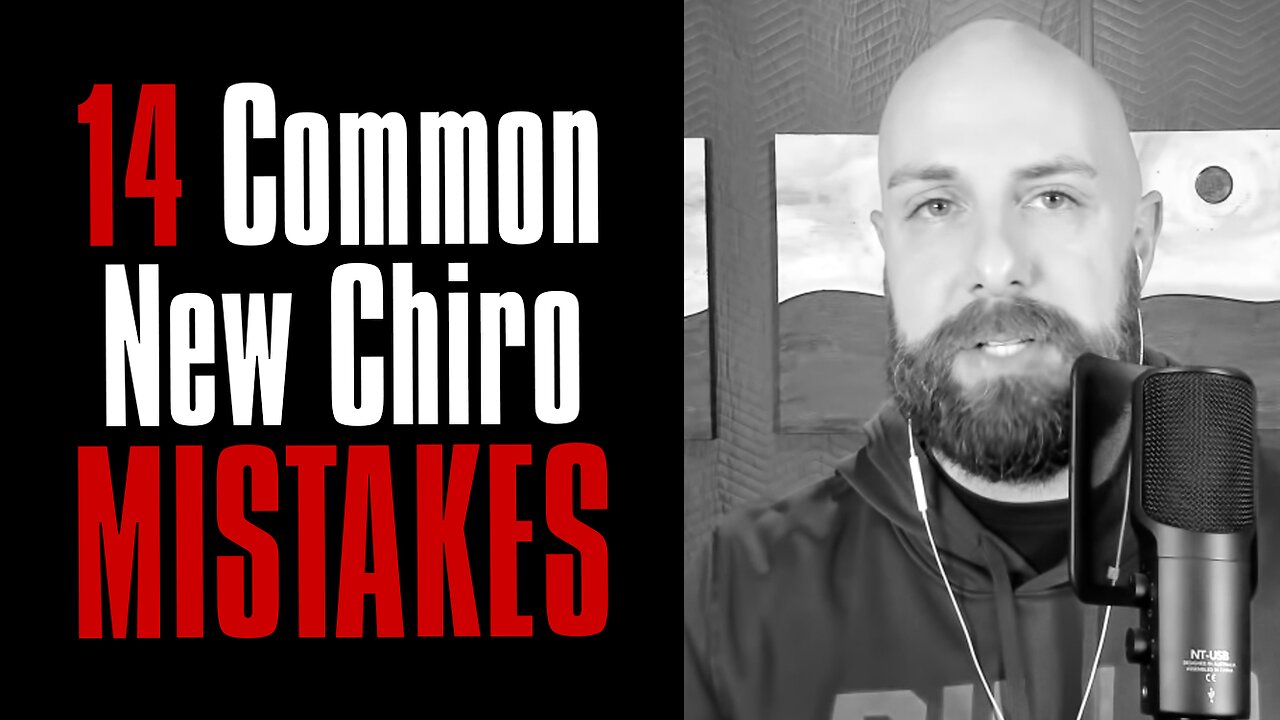Premium Only Content

14 Common Mistakes That Chiropractors Make When Starting Their Practice
Business & marketing training for chiropractors: https://rocketchiro.com/join
Free practice assessment: https://rocketchiro.com/chiropractic-practice-assessment
Chiropractic podcast: https://rocketchiro.com/chiropractic-podcast
Best chiropractic websites: https://rocketchiro.com/best-chiropractic-websites
Chiropractic SEO: https://rocketchiro.com/chiropractic-seo
I would argue that most people who decide they want to be a chiropractor, in their heart, just want to help people and make a good living while doing it. That doesn’t seem to be too much to ask, right?
Unfortunately, for many chiropractors, they struggle to do just that. They get out of school, excited about their new career, only to find out that it’s not as simple as getting a job, helping a lot of people, and making a good living.
Sure, there are plenty of jobs out there for chiropractors, but most of them are well below 6 figures. I’m not the type of person who believes that money is the only thing that matters, but I do believe that the average chiropractor should make an income that warrants the amount of time, energy, and money that it requires to become a chiropractor.
In short, if chiropractic colleges are going to charge an arm and a leg to chiropractic students to get a Doctor of Chiropractic degree, I think it’s OK for chiropractors to expect to make a 6-figure income. The good news is that lots of chiropractors make a 6-figure income. The bad news is that they rarely do it as an associate.
If you want to make a 6-figure income as a chiropractor, you are most likely going to do it by starting your own chiropractic practice. Like it or not, you’re going to have to venture into the world of small-business ownership, and that’s something that chiropractic college DID NOT prepare you for.
Thankfully, there are a TON of business and marketing resources out there for chiropractors. This hasn’t always been the case. In fact, when I graduated from chiropractic college in 2004, it was really hard to find help unless you were lucky enough to have a chiropractor (who knew what they were doing) take you under their wing, or you could afford ridiculously overpriced (and often not very helpful) chiropractic coaching. Those were basically your only options.
Today there are books, videos, podcasts, training courses, online coaching, virtual summits…the number of practice-building resources available to young chiropractors is almost endless. And as an added bonus, most of these practice-building resources are very affordable. Heck, the free stuff now is better than the expensive chiropractic coaching was back in the day.
The bigger problem nowadays is that chiropractors almost have too many choices for advice. Seems like EVERYONE has advice to give. There are even chiropractic students out there giving practice success advice before they’ve ever practiced a day in their life. Crazy!
With so many resources and so many voices telling young chiropractors how to be successful, it’s easy to get overwhelmed. Young chiropractors who listen to 100 different “experts” with 100 different keys to success can find themselves being pulled in 100 different directions. That’s rarely a good thing.
With all that being said, that brings me to the point of this article. Over the last 7-8 years, I’ve had the chance to help many young chiropractors as they start their chiropractic careers. When a chiropractor is starting their practice it’s a very stressful time, and it’s also a time when new chiropractors make new chiropractor mistakes.
Thankfully, many new chiropractor mistakes can be avoided. But it’s hard to avoid things that you don’t even know what they are. Ignorance may be bliss, but it’s not helpful if you are trying to minimize mistakes.
Common Mistakes That Young Chiropractors Make
So what I decided to do is create a list of some of the most common mistakes that I have seen new chiropractors make during the early stages of their careers. This is NOT a complete list of mistakes and I’m not going to do a deep dive into each one. I just want new and/or struggling chiropractors to be aware of these common mistakes, so they can start taking steps to avoid (or correct) them.
Let’s get started…
1. Finding Time Instead of Making Time
Chiropractors often think they will “find time” to do the important things. That’s a mistake. As a general rule, people don’t find time. They make time.
So if it’s important for the success of your chiropractic practice, schedule time to do it. Don’t just hope you will find time during the week/month. You most likely won’t.
2. Doing Too Many Things at Once
On the surface, it makes sense to try to do as many things as possible. Especially as a chiropractor when you always have a million things to do. Why not try to get them all done?
When a chiropractor tries to do too many things at once, projects tend to get partially done instead of completely done. When this happens, nothing changes. Chiropractors who work on too many things at once will find themselves exhausted with little to show for it.
Chiropractors should work on the one or two things that are most important right now. Get them done so they can make a difference in their practice. Then (and only then) they can start working on something else.
3. Starting Too BIG
The most important thing for new chiropractors is that they get their head above water as soon as possible. Making the mistake of starting too big just puts the chiropractor behind the financial 8-ball and makes the early months/years of practice harder than they need to be.
It makes sense for most chiropractors to start small. Chiropractors should consider starting with a micro practice and scaling from there. It’s much easier to start small and expand than it is to start too big and have to scale down.
4. No Method to Their Madness
Most chiropractors lack any sort of structure when they first start their practices. That’s a major problem. If a chiropractor doesn’t have a set way of doing things, how will they know if what they are doing is working?
Practice structure is a chiropractor’s friend. It will allow them to excel. A lack of structure causes quality control, consistency problems, troubleshooting problems, and growth problems. A lack of structure for a chiropractor is a HUGE mistake.
5. No Clear Value Communicated
Chiropractors often fail to communicate their value in a way that people can easily understand. Some chiropractors don’t even try to communicate value because they’ve never thought about it. Others will try, but they put it into words that no one understands unless they happen to be another chiropractor.
I’m assuming that most chiropractor’s patients are not other chiropractors. This is why it’s so important for chiropractors to figure out how to communicate their value in a way that their ideal patient can understand.
What problem does the chiropractor solve for their patients? Chiropractors should communicate that to people using the words that the patient would use. That’s a great place to start.
6. Letting Fear Keep Them From Starting
Starting a chiropractic practice is scary. Don’t let anyone tell you otherwise. But chiropractors who think they can prepare enough that the fear will go away should know…they can’t.
Yes, chiropractors should do everything they can to prepare for starting their practice. But if a chiropractor is going to wait until they aren’t scared to start their practice…they will never start.
I’ll give you the piece of advice that my chiropractor gave me when I told him I was scared to start my own practice. He said, “You can start your practice now and be scared. Or you can work for someone else for 2 years and start your practice then and be scared. Either way, you’re going to be scared.”
7. No Target Market
Often times when I ask chiropractors who they are going to help as a chiropractor, they will give me a generic “anyone with a spine” answer. I know that the average chiropractor thinks that casting a broad net is the best way to grow a practice. But that’s not how marketing works.
When a chiropractor tries to be everyone’s chiropractor they end up being no one’s chiropractor. It’s always better from a marketing/branding standpoint to start narrow and expand from there.
Chiropractors should take the time to identify their ideal patient and then build their marketing/branding around helping that person. That’s a MUCH more effective way to grow a successful chiropractic practice.
8. No Patient Recommendations
Patient recommendations should be a normal part of the patient care process. It’s the chiropractor’s job to let the patient know what the plan is going forward so everyone can be on the same page.
Chiropractors who fail to give their patients clear recommendations are bound to have patient retention issues. When patients don’t follow through with their care, they are unlikely to get the best possible results from their chiropractic care. It’s a loss-loss situation for everyone.
9. No Patient Follow-Up Plan
It’s not uncommon for chiropractic patients to get off of their care schedule. There are many different reasons why that may happen. Some of them are avoidable and some of them are not.
Regardless of the reason, chiropractors need to have a plan in place for what to do when an active patient misses their appointment. Otherwise, one missed appointment could turn into a patient discontinuing care before they should.
With that said, sooner or later almost every patient will discontinue active care. That’s why chiropractors should also have a plan in place for staying in touch. Staying top of mind will make it more likely for a patient to revisit the same chiropractor the next time they need chiropractic care.
Having a follow-up plan for both active patients and inactive patients will make sure that no one is overlooked and that no one is being contacted too much. The goal is to maintain the doctor-patient relationship. Having an established follow-up plan helps chiropractors do just that.
10. Poor Communication Skills
Chiropractors are in the people business. There’s no way around it. That’s why communication skills are so crucially important. The chiropractors who are better at communicating tend to have the most successful practices.
Chiropractors who are naturally gifted communicators tend to get even better with time without having to be very intentional about it. Chiropractors who are not naturally gifted communicators do not usually get better with time unless they are intentional about improving their communication skills.
It’s important for chiropractors who are not naturally gifted communicators to understand the importance of communication and to commit to developing that skill. If they don’t, their poor communication skills will constantly be holding back their practice growth.
11. No Plan for Meeting New People
Chiropractors always have more things to do than they have time. That’s part of the deal when it comes to owning your own business/practice. It’s easy for chiropractors to get stuck in the hamster wheel of daily projects and overlook the importance of meeting new people.
Meeting new people is the starting point for marketing and practice growth. If people don’t even know a chiropractor exists, they will never choose that chiropractor. I think that’s pretty obvious.
Chiropractors should constantly be meeting new people. Whether it’s online, offline, or through a third party, more people should know about a chiropractor’s practice this month vs last month. And that should be the case EVERY month.
12. Failing to Lean Into Their Strengths
It’s a mistake for chiropractors to focus too much energy on improving their weaknesses. Of course, chiropractors should be committed to excellence. So improving in any area is a good thing.
But as a general rule, people don’t go from being terrible to being excellent at something. People do go from being good to being excellent at something, and it’s those excellent things that are going to make the biggest impact in a chiropractor’s practice.
That’s why I encourage chiropractors to focus on their strengths instead of obsessing about their weaknesses. If a chiropractor identifies areas where they are naturally gifted, improving those strengths and finding ways to leverage them in practice is what’s going to make the biggest impact.
13. Failing to Improve Adjustment/Treatment Skills
Chiropractors are in a performance-based profession. It’s great to be a smart chiropractor, but if you can’t deliver when it comes to adjustments/treatment, no one cares how big the chiropractor’s brain is.
Chiropractors owe it to themselves and their patients to be the absolute best at their craft. Good enough should not be good enough. Chiropractors who lack adjustment/treatment skills will get subpar results and will struggle with patient retention. After all, who wants to go to a chiropractor who sucks?
14. Failing to Set The Table
Chiropractors often hope that something will happen without creating an environment where that thing is likely to happen. It’s like hoping to have a nice dinner without setting the table. Let me explain.
If you want patients to start leaving reviews, it makes sense to create an environment where reviews are normal. If the first time the thought of a review crosses a patient’s mind is when the chiropractor asks for one, the chiropractor hasn’t done a good job of setting the table.
If the patient had seen posters on the walls with reviews from past patients. If the patient had seen a sticker on the front door that said, “Review us on Google.” If the patient had noticed a poster behind the front desk that had a thank you message for patients who had left reviews.
Then when the chiropractor asked for a review, it didn’t just come out of nowhere. The chiropractor created a practice environment where reviews are normal. In an environment like that, patients are much more likely to leave a review.
-
 18:52
18:52
Rocket Chiropractic Podcast
1 month agoWhy Do I Have So Few New Patients When My Website Has So Many Visitors?
71 -
 1:09:42
1:09:42
Mike Rowe
4 days agoHow Did THIS Dirty Job Make Tommy Mello A Billionaire?! | #447 | The Way I Heard It
14.9K12 -
 LIVE
LIVE
SpartakusLIVE
8 hours agoThe BADDEST Duo in WZ Exhibits PEAK Physique || Duos w/ Sophiesnazz to start, quads later
8,874 watching -
 2:49:37
2:49:37
RattlesnakeTV
19 hours ago $0.10 earnedLIVE DEBATE! Lord Jake vs Crazy Feminist
14.1K10 -
 4:00:42
4:00:42
Badlands Media
11 hours agoThe Narrative Ep. 35: Codex of Truth
82K40 -
 3:55:56
3:55:56
Due Dissidence
14 hours agoSchmuley TRASHES Shapiro, Maxwell Sings For Pardon, Uhuru Doc Preview - Live From St. Louis!
39K38 -
 LIVE
LIVE
Lofi Girl
2 years agolofi hip hop radio 📚 - beats to relax/study to
369 watching -
 2:23:21
2:23:21
PandaSub2000
5 days agoMadison VR (Part 4) | PSVR 2000 (Original Live Version)
18.6K2 -
 2:34:32
2:34:32
Badlands Media
5 days agoCODEX 9/11
295K254 -
 1:53:43
1:53:43
Nerdrotic
8 hours ago $0.30 earnedMysteries of 3I/ATLAS | Forbidden Frontier #113
52.1K5